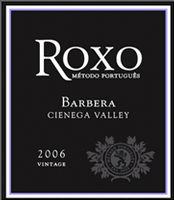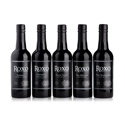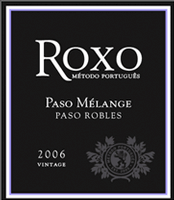Picture this: The year is 2005 and two young couples are sitting around a campfire throwing ideas around when one of the guys  says, ‘Let’s go and do a port winery, something really different for Paso Robles.’ Opening a port winery in this day and age is like saying to your wife and two friends, ‘Let’s go throw some money down a hole, some really unlikely sort of hole….’
says, ‘Let’s go and do a port winery, something really different for Paso Robles.’ Opening a port winery in this day and age is like saying to your wife and two friends, ‘Let’s go throw some money down a hole, some really unlikely sort of hole….’
Crazy or not, Aaron and Erin Culp and Jeffrey and Kimberly Steele latched onto the idea and nodded their collective heads as Jeff Steele (who came up with the idea), added, ‘We all kinda said, let’s try it, and see if we can actually do it.’ And do it they did. Roxo Port Cellars is now making a line of port-style fortified wines, with clever names, in a neighborhood venture in Paso Robles. On their striking-yet-simple black and silver labels, under the name Roxo (that’s Portuguese for purple) is ‘Metodo Portugues,’ a statement and a vow from the partners that the wine in the bottle is made keeping with the true Portuguese methods of port making.
 ‘The Team,’ as they refer to themselves, uses a variety of international grapes that is as wild as the basic idea behind the enterprise of launching a new California port works in these troubling times. Besides traditional Portuguese varieties such as Touriga Nacional, Souzao, Tinta Roriz and Bastardo, they purchase and use Barbera, Zinfandel, Cabernet Sauvignon, Petit Verdot and Negrette, the latter being a variety native to southwest France, but rarely seen in Portugal or California. Barbera is native to Italy and Tinta Roriz is the same as Spanish Tempranillo.
‘The Team,’ as they refer to themselves, uses a variety of international grapes that is as wild as the basic idea behind the enterprise of launching a new California port works in these troubling times. Besides traditional Portuguese varieties such as Touriga Nacional, Souzao, Tinta Roriz and Bastardo, they purchase and use Barbera, Zinfandel, Cabernet Sauvignon, Petit Verdot and Negrette, the latter being a variety native to southwest France, but rarely seen in Portugal or California. Barbera is native to Italy and Tinta Roriz is the same as Spanish Tempranillo.
Last November, Roxo released its first wines from the 2006 vintage, including Magia Preta 2005, a Cabernet Sauvignon and Syrah blend; Ruby Tradicional, a traditional Portuguese style ruby port blended from four Portuguese grapes; Paso Melange, a fortified ‘Meritage’ wine; Barbera 2006, a unique blend of Barbera, Zinfandel and Souzao; and Negrette 2006. Aaron Culp and Jeff Steele are the winemakers and they’re learning as they go, including taking turns punching down the fermenting must and cap three to four times daily until fortification, then assembling the individual lots into a final blend, followed by barrel aging in a variety of ‘semi-neutral’ oak barrels. Roxo Ports are bottled unfined and unfiltered.
I had the opportunity recently to taste three of the new Roxo  Ports and I must say that I was impressed with the clean fruity flavors, seamless blends and very good integration of what appears to be a very high-grade spirit used as the fortification. Except for pleasing and refreshing acidity, I can’t say that the varietal Barbera smelled or tasted like Barbera, but it was very nice and earned a score of 90 in my review. However, the traditional ruby-style port (94 points) and the Melange (89) were artful blends, forming a satisfying whole with no one variety standing out.
Ports and I must say that I was impressed with the clean fruity flavors, seamless blends and very good integration of what appears to be a very high-grade spirit used as the fortification. Except for pleasing and refreshing acidity, I can’t say that the varietal Barbera smelled or tasted like Barbera, but it was very nice and earned a score of 90 in my review. However, the traditional ruby-style port (94 points) and the Melange (89) were artful blends, forming a satisfying whole with no one variety standing out.
Roxo Port Cellars is a daring venture by two adventurous couples. With any luck in these hard economic times, Roxo will take its rightful place alongside the handful of other California port makers. For more information on Roxo ports, go to their web site at www.roxocellars.com
6
